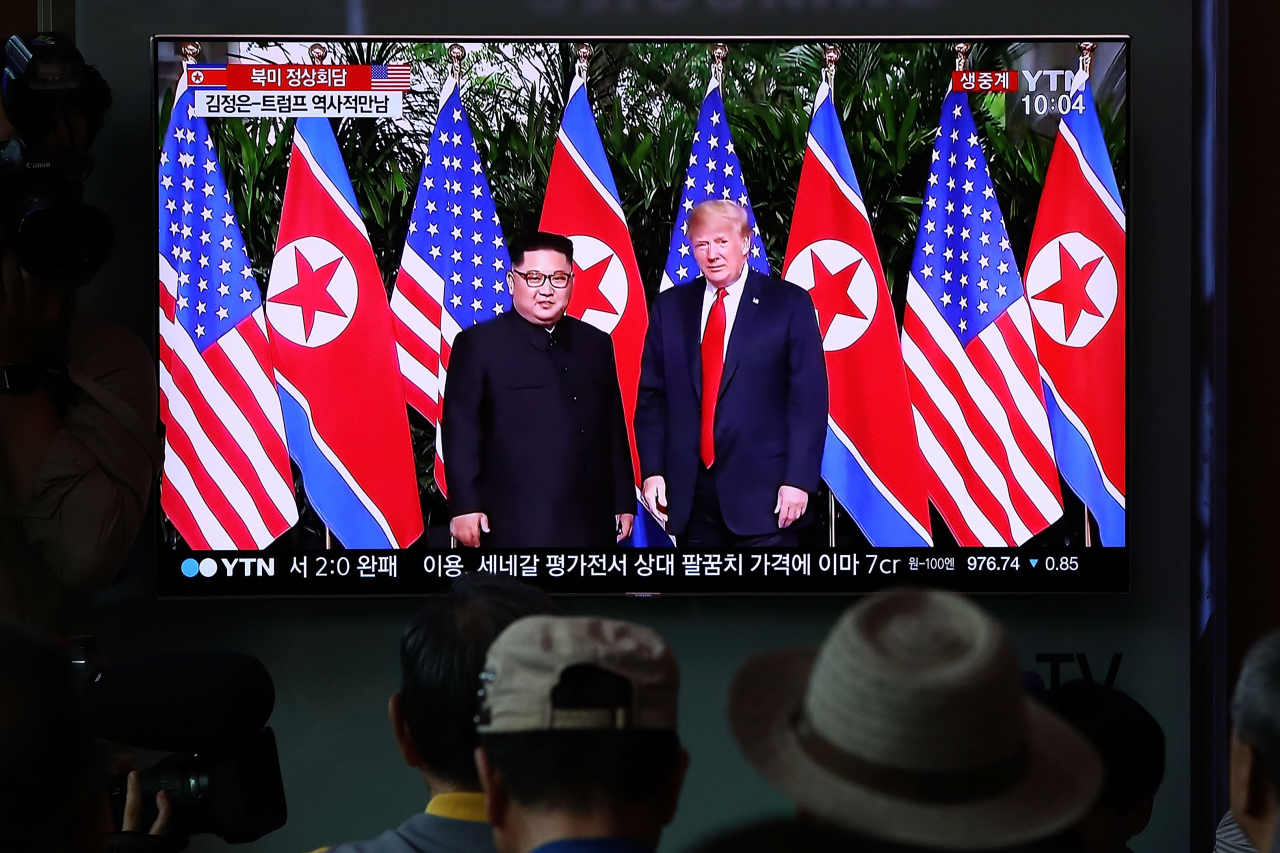
 > National > North Korea
> National > North Korea
 |
| People watch on a screen reporting on the former US President Trump meeting with North Korean leader Kim Jong-un at the Seoul Railway Station on Jun. 12, 2018 in Seoul. (Getty Images) |
North Korean leader Kim Jong-un may try to rekindle his "bromance" with former President Donald Trump if he returns to the White House, a former US official said Monday, predicting Kim could propose a deal to limit his regime's nuclear program in return for American troops' pullout from South Korea.
H.R. McMaster, who served as national security advisor for Trump from 2017-2018, made the remarks amid speculation that the GOP presidential nominee, if reelected, could seek direct diplomacy with Kim in pursuit of a peace deal.
During his nomination acceptance speech last week, Trump boasted about his personal ties with Kim and signaled his apparent desire to reengage with the North Korean leader.
"I think if Donald Trump is elected president, what you're going to see right away is Kim Jong-un trying to rekindle their bromance," McMaster said during an online chat hosted by the Washington-based Hudson Institute.
"Then what he's going to do right after that is he's going to say, 'Hey, I've got a deal for you. I'm going to satisfy your impulse toward retrenchment, and in exchange for US forces leaving the peninsula and just letting me have only just a few nukes, I will stop my long-range ballistic missile program, and I'll limit my nuclear program,'" he added.
The former White House official stressed that Kim may angle for an agreement like the Iranian nuclear deal that Washington withdrew from during Trump's presidency in 2018.
"He's going to hope to get something like an Iran nuclear deal -- a terrible deal for the United States. He won't get that from a Trump administration, but he's posturing himself for that," he said.
Though Trump, if reelected, could seek to complete the unfinished business of addressing the North Korean quandary, uncertainty remains over whether Pyongyang would accede to any US outreach at a time when it is deepening cooperation with Moscow in the midst of Russia's war in Ukraine.
Touching on a deepening military alignment between Moscow and Pyongyang, McMaster said that what Kim wants is to "break out of isolation."
"Russia has helped him do that with providing the energy needs for North Korea. This let up a lot of pressure on North Korea," he said.
He claimed that North Korea, Russia and China want to push the US "out of critical regions."
"What you hear over and over again is this mantra of getting the US out of these regions so China can establish an exclusionary area of primacy across the Indo-Pacific, North Korea can get the US off the peninsula as the first step in unifying the Korean peninsula," he said.
"What Iran wants to do is again to extend his hegemonic influence, and Russia wants to reestablish itself as a great power and reestablish the Russian Empire."
On the issue of defense cost-sharing with allies, he stressed Trump's argument against "free riding."
"This is where President Trump has had a very strong argument: Americans don't want people free-riding on their largesse," he said.
He pointed to South Korea and Japan as burden-sharing examples.
"South Korea, for example, has a very robust defense capability as (it is) increasing their defense spending," he said. "Both of those countries defray the cost of US forces such that if you were to move those US forces to the United States, you would pay three or four times more as taxpayers to sustain those forces and their facilities." (Yonhap)








